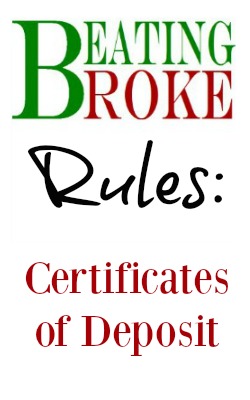What is a Certificate of Deposit? Certificate of Deposit (commonly called CDs) are basically a savings account that pays a set rate over a set term. The rate tends to be higher than a normal savings account rate because the money is locked into the CD for a set term. If you choose to withdraw your money before the term ends, you pay a penalty. The penalty is usually a preset number of months interest on the CD. At the end of the term, you can renew for another term at another set rate or keep your money.

CDs are a very stable investment. They are also a very liquid investment. As such, they make for rather poor returns on the long term and they carry a penalty for withdrawal before the “maturity”. However, there are several uses that can make them a valuable part of your financial portfolio.
6 and 12 month CDs can be a great place to keep your emergency fund. Chances are you won’t need the money, so you might as well invest it. The key here is that the CD is a safe, stable, and easily accessible form of investment. You’ll still get the higher interest rates that you would expect from a high-yield savings and, depending on the term length, sometimes better.
As you get older, CDs can play an important role in your retirement accounts as a small percentage of your portfolio. Again, the stability and reliability of the nature of CDs makes is the key. As you age, a growing portion of your retirement portfolio should be in stable cash investments. Many will recommend something like a money market account or a high yield savings, but CDs are in that same group. And with a retirement account, you can usually tie the money up a little longer and get better returns. Look for something in the 2-5 year range for maturity.
As I mentioned before, one of the major drawbacks to CDs is the early withdrawal penalty. In most cases (consult your CD paperwork) the penalty is 3 months interest. So, if you were to withdrawal the money after only three months, you would only be able to withdrawal the original amount. If you withdrawal the money at only one month, you would get less than the original amount. Anytime after 3 months and you get the original amount plus any interest above the three months penalty.
While the penalty can be bad if you need the money early in the term, if you need the money for an emergency, it can be overlooked pretty easily.
Beating Broke Rule: CDs can be an important part of your investment portfolio

Shane Ede is a business teacher and personal finance blogger. He holds dual Bachelors degrees in education and computer sciences, as well as a Masters Degree in educational technology. Shane is passionate about personal finance, literacy and helping others master their money. When he isn’t enjoying live music, Shane likes spending time with family, barbeque and meteorology.
